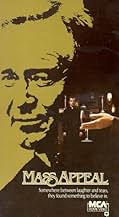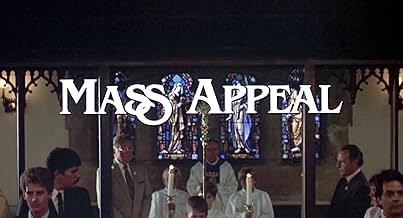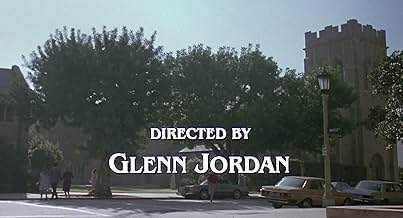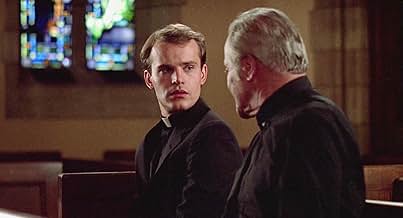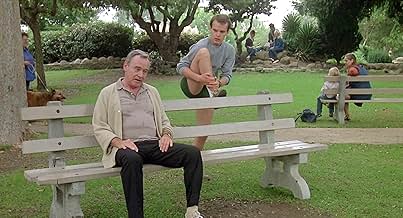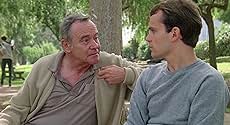AVALIAÇÃO DA IMDb
6,7/10
1,2 mil
SUA AVALIAÇÃO
Adicionar um enredo no seu idiomaA popular Connecticut priest shields a seminary rebel from the wrath of a stern monsignor.A popular Connecticut priest shields a seminary rebel from the wrath of a stern monsignor.A popular Connecticut priest shields a seminary rebel from the wrath of a stern monsignor.
- Prêmios
- 1 vitória no total
Avaliações em destaque
I consider this film to be a real little gem -- unlike the original Broadway production. Its premises ring true and the ensemble acting is superb. Lemmon and Ivanek are extremely well matched as lost or submerged parts of the other in this cautionary tale about mainstream religion straining at the limits of its ability to accommodate and hold accountable truths found in the "wider" world. Lemmon's performance, especially, is artless and memorable, avoiding sentimentality and undue predictability. It is most unfortunate that in the days after Lemmon's death that no reviewer of his oeurve decided to cite this film or show clips from it in describing the actor's versatility and "every-manness." It should not be missed; so compelling is the uneasy and finally transformative relationship between the two men that one is left wondering what happens to both priest and seminarian in the years that follow. Rent this of a Sunday afternoon when you're longing to experience some rising spirit.
The best part of this movie is the performance by Jack Lemmon as Father Farley, the aging and very comfortable (indeed, far too comfortable) priest of a Roman Catholic parish. Farley is loved by his people - and he loves being loved. He loves the people in return, but more than that - he needs the people; he needs the sense of belonging that he gains from them; the sense of identity he gets from them. He can't bear the thought of losing them, which ironically makes him less effective as their priest. He has a friendly but sometimes strained relationship with the local monsignor (played by Charles Durning) - a relationship pushed to the breaking point when the monsignor assigns a young seminarian, Mark Dolson (Zeljko Ivanec) to Farley's parish as a deacon. The monsignor doesn't like Dolson. He's under suspicion for his too quick defence of two fellow seminarians expelled because it was believed that they were gay. After defending Dolson, Farley is given the responsibility of turning Dolson into a "real" candidate for the priesthood in a month.
I think people misunderstand this movie. It's easy to think that this is about the struggles of being gay and a priest in the Catholic Church. But that's not what this is about at all - at least not to me. This was really about Farley, and his struggles with his own identity - not sexual, but his waning sense of vocation and his desire just to keep people happy and not make waves. His priesthood is being lived out in a cloak of fear that something might go wrong; that his parish might get upset with him; that the monsignor might transfer him. He lacks joy, purpose and fulfilment in his vocation. Lemmon captured that. In a neat trick of camera-work, there was a wonderful shot of Father Farley in the pulpit, in full clerical dress, standing before his congregation - and he looked so small, so vulnerable and even so unimportant. That's what Farley had become.
This was the point of the movie - not Dolson. Dolson pushed Farley. In a strange sort of way, even though he was a pain in Farley's neck, he encouraged Farley; he ultimately enlivened Farley and helped Farley regain that sense of purpose in his vocation as he finally works up the courage to take on the monsignor and make himself vulnerable to his parish by appealing to them to support Dolson. I thought this was very well done.
Durning as the monsignor was also significant. His character pointed out every well the problems of an overly hierarchical and authoritarian ecclesiastical structure. Decisions could get made and people's entire vocations and futures decided at his whim, without any evidence to back up his suspicions. The monsignor was a threatening character; a very dark character which Durning pulled off well.
Keep in mind that this movie is almost 30 years old. It doesn't address any of the current scandals in the Roman Catholic Church because they just weren't out there publicly in 1984. It deals with one priest's failing calling, and one seminarian's attempt to determine if he has a calling. Basically, this was extremely well done on everyone's part. It's one of the better "church" movies I've ever seen. 8/10
I think people misunderstand this movie. It's easy to think that this is about the struggles of being gay and a priest in the Catholic Church. But that's not what this is about at all - at least not to me. This was really about Farley, and his struggles with his own identity - not sexual, but his waning sense of vocation and his desire just to keep people happy and not make waves. His priesthood is being lived out in a cloak of fear that something might go wrong; that his parish might get upset with him; that the monsignor might transfer him. He lacks joy, purpose and fulfilment in his vocation. Lemmon captured that. In a neat trick of camera-work, there was a wonderful shot of Father Farley in the pulpit, in full clerical dress, standing before his congregation - and he looked so small, so vulnerable and even so unimportant. That's what Farley had become.
This was the point of the movie - not Dolson. Dolson pushed Farley. In a strange sort of way, even though he was a pain in Farley's neck, he encouraged Farley; he ultimately enlivened Farley and helped Farley regain that sense of purpose in his vocation as he finally works up the courage to take on the monsignor and make himself vulnerable to his parish by appealing to them to support Dolson. I thought this was very well done.
Durning as the monsignor was also significant. His character pointed out every well the problems of an overly hierarchical and authoritarian ecclesiastical structure. Decisions could get made and people's entire vocations and futures decided at his whim, without any evidence to back up his suspicions. The monsignor was a threatening character; a very dark character which Durning pulled off well.
Keep in mind that this movie is almost 30 years old. It doesn't address any of the current scandals in the Roman Catholic Church because they just weren't out there publicly in 1984. It deals with one priest's failing calling, and one seminarian's attempt to determine if he has a calling. Basically, this was extremely well done on everyone's part. It's one of the better "church" movies I've ever seen. 8/10
Jack Lemmon shines as Father Farley, a spineless priest who'll say anything to anyone if it makes his life easier. Through a series of circumstances, he has to face himself as a result of being "assigned" Mark Dolson as a deacon.
When I first watched this movie, I was disappointed by the ending, because it didn't seem to resolve the main issue (which concerns Mark Dolson). But eventually I realized that it issue was Father Farley, and his spinelessness, and Mark Dolson was merely the means by which Farley is brought to terms with himself.
My second favorite movie of all time.
When I first watched this movie, I was disappointed by the ending, because it didn't seem to resolve the main issue (which concerns Mark Dolson). But eventually I realized that it issue was Father Farley, and his spinelessness, and Mark Dolson was merely the means by which Farley is brought to terms with himself.
My second favorite movie of all time.
Pity the poor congregation of St. Francis Parish, subject to "dialogue sermons" (what???), autobiographical psycho-babble and in the end, self-righteous calls to rise up against the local Church hierarchy. If things are really like this in the Catholic Church today, its enough to make this lapsed Catholic stay that way for a long time. That said, and hoping that this does not mirror reality, the movie works as entertainment, largely due to the performances of the two main characters. Jack Lemmon is delightful and convincing as a lonely priest who has found strategies (some decent ones, some hurtful) to survive who takes on the task of mentoring and tempering the well-meaning but naive passions of a young seminarian, also well played. The big casualty is in the one-dimensionality of the "heavy" played by Charles Durning, and perhaps of all of his cronies as well. Well, Catholic bashing is nothing new, mostly by ex-Catholics, but it always diminishes the dialogue such issues could provoke. However, there is more to the movie than this, especially in some very good characterizations of Catholic lay people, Louise Latham's housekeeper in particular.
Given all the revelations of sex abuse in the Catholic Church, Mass Appeal in its
own way is as dated as Going My Way in its picture of the Catholic Church and its
inner workings. Still the relationship of Jack Lemmon and Zeljko Ivanek isn't
exactly Bing Crosby and Barry Fitzgerald.
Playwright Bill C. Davis was hired to expand for the screen his two person play which 212 performances on Broadway in the 1981-82 season. It would hardly do to fill 100+ minutes of screen time with two priests just talking. Still the main focus is on popular parish priest Jack Lemmon and Zeljko Ivanek who is quite the oddball rebel at the seminary.
The monsignor in charge of the seminary Charles Durning wants Lemmon to take this kid in hand and explain the facts of life to him otherwise his ambition to be a priest will never be fulfilled. But as these two go back and forth one starts to wonder who is changing who.
On stage it worked to have the forces of repression as Ivanek sees them just be in the abstract. But for the screen Durning's role is critical in that the audience has to have the forces of oppression be personalized. Otherwise it would not have worked.
What the issues are I won't reveal, but as I said the sex abuse scandals have really dated Mass Appeal. Still it's a fine film with great performances from Lemmon, Ivanek, and Durning.
Playwright Bill C. Davis was hired to expand for the screen his two person play which 212 performances on Broadway in the 1981-82 season. It would hardly do to fill 100+ minutes of screen time with two priests just talking. Still the main focus is on popular parish priest Jack Lemmon and Zeljko Ivanek who is quite the oddball rebel at the seminary.
The monsignor in charge of the seminary Charles Durning wants Lemmon to take this kid in hand and explain the facts of life to him otherwise his ambition to be a priest will never be fulfilled. But as these two go back and forth one starts to wonder who is changing who.
On stage it worked to have the forces of repression as Ivanek sees them just be in the abstract. But for the screen Durning's role is critical in that the audience has to have the forces of oppression be personalized. Otherwise it would not have worked.
What the issues are I won't reveal, but as I said the sex abuse scandals have really dated Mass Appeal. Still it's a fine film with great performances from Lemmon, Ivanek, and Durning.
Você sabia?
- CuriosidadesAccording to actor Zeljko Ivanek, the fish sermon scene was shot 15 times from three different angles. Although Ivanek considers the last take the best, most of it didn't make the final cut because it was too emotionally jarring for the audience.
- Citações
Father Tim Farley: You're a lunatic! And Christ NEEDS lunatics. But the trouble with lunatics is, they don't know how to survive.
- Cenas durante ou pós-créditosThis picture is dedicated to the memory of Ray A. Kroc.
- ConexõesFeatured in At the Movies: Dune/Starman/Mass Appeal/Runaway (1984)
Principais escolhas
Faça login para avaliar e ver a lista de recomendações personalizadas
- How long is Mass Appeal?Fornecido pela Alexa
Detalhes
- Data de lançamento
- País de origem
- Idioma
- Também conhecido como
- Mass Appeal
- Locações de filme
- Claremont, Califórnia, EUA(myself, as I was an extra in this film)
- Empresas de produção
- Consulte mais créditos da empresa na IMDbPro
Bilheteria
- Orçamento
- US$ 7.000.000 (estimativa)
- Faturamento bruto nos EUA e Canadá
- US$ 1.945.658
- Faturamento bruto mundial
- US$ 1.945.658
Contribua para esta página
Sugerir uma alteração ou adicionar conteúdo ausente


